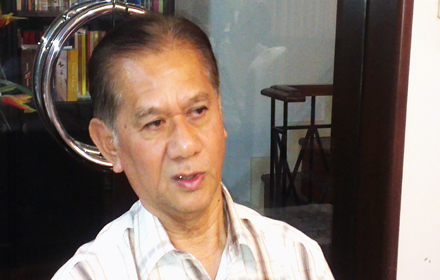Southern people want four issues to be addressed as priority
"We are not Superman!, and do not expect too much from us!"

The two above-mentioned sentences came from the horse’s mouth – former Narathiwat MP Areepen Utarasin and a core member of the Wadah group which was recently recruited as advisors on security affairs in the deep South of Deputy Prime Minister Chalerm Yubamrung.
Some might have wanted to ask the Wadah group: "Then why did you agree to be the advisors in the first place?"
The above statement by Mr Areepen should send a message to the Thai society that the conflict in the troubled region could not be resolved by "a knight in a white charge" but by all parties concerned.
The Isra news agency had an opportunity to talk with Mr Areepen at his residence in Bangkok for about two hours. The followings are excerpts of the exclusive interview.
Mr Areepen believes that violence in the deep South was rooted in injustice and abuses by state authorities against the ethic Malay Muslims such as the Tak Bai incident and the widespread misuse of executive decree in arresting and detaining of suspected insurgents.
According to the ex-MP, the people in the region want justice, safety, good quality of life and respect of their identity. If the four issues can be addressed, there is a good chance that the conflict there can be resolved.
The number of armed insurgents is not huge and that the government is capable of handling the problem, but the government should try its best to prevent people in the region to join or support the insurgency cause. Mr Areepen believes that up to 90 percent of the population in the three southernmost provinces want peace to be restored.
The southern conflict is a local problem and should be resolved by the locals, said Mr Areepen, adding that he does not agree with the use of security forces, including army and the police, from the other regions, to fight the insurgency war in the deep South.
Although violence such as bombings and shootings are against the law, the insurgents are not habitual criminals and they committed violence in pursuit of an ideological cause. The government must be patient and calm in dealing with the insurgency problem. Do not fight fire with fire but with cold water, said Mr Areepen.
Regarding the ideology for an autonomous Pattani, Mr Areepen said: "Here is an example I would like to tell. There is a son of one of my friends. He is a good boy and, one day, he said he would stop the study because it is pointless and we are to become independent. This is a true story and my friend wanted me to talk to his son."
Areepen said his friend’s son decided to go back to school after he had talked with him. But he reminded the government to realise that there are people in the region, especially young men, who have aspired for an independent or autonomous Pattani.
The former Narathiwat MP is supportive of the concept of peace talk with the insurgent groups but he doubts that the military will agree with the concept because they don’t know whom to talk with.
The government, said Mr Areepen, must take the initiative to announce publicy that it wants peace talk with the insurgent groups. The insurgents are in the dark and they will not take the initiative first, he added.
Without peace talk, violence will continue unabated with both sides with both sides affected.
Mr Areepen rejected the suspicion that the Wadah group or someone in the group is quietly assisting the insurgency cause while purusing parliamentary politics. "This is impossible. We always uphold peaceful means."
The ex-MP also denied that his elder brother, Romli, is a separatist. He said he was not close to Romli who was adopted by a relative in Malaysia since he was seven. Romli was education in Indonesia and returned to Thailand to pursue business after graduation. But he escaped to Malaysia after a teacher who was arrested by Thai security forces implicated him of involvement in separatist movement.
The Wadah group was created in 1985 within the Democrat party. The group won six parliamentary seats in the deep South and were promised a cabinet seat as a reward by then party’s secretary-general, Veera Musikapong. Then the group leader, Mr Den Tohmena, was promised to be nominated a minister but the promise was broken by the Democrats claiming that General Prem Tinsulanonda objected to Den’s nomination.
The Wadah group found out later that the Democrats did not nominate Mr Den and the claim that General Prem objected to Den’s nomination was a lie. The group later broke away from the Democrat party to join the other defectors to form the January 10 group.
Mr Areepen said that after the armoury robbery by insurgents on January 4, 2004, several Wadah members were charged or wanted by the security forces on suspicion that they were involved or supportive of the insurgency movement. He said he himself and Mr Den were wanted by the security forces but the court refused to issue warrants for their arrest.
Mr Areepen defended that Den’s late father, Haji Sulong, was not a separatist leader as accused by the government but just a person who demanded self-rule for Pattani.
